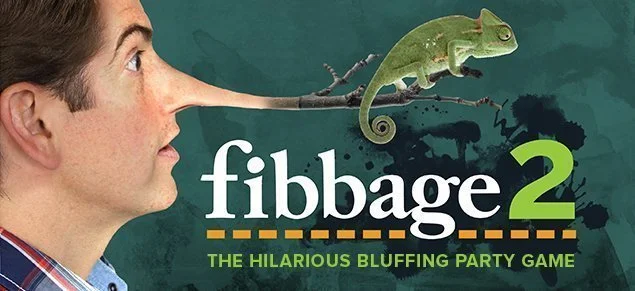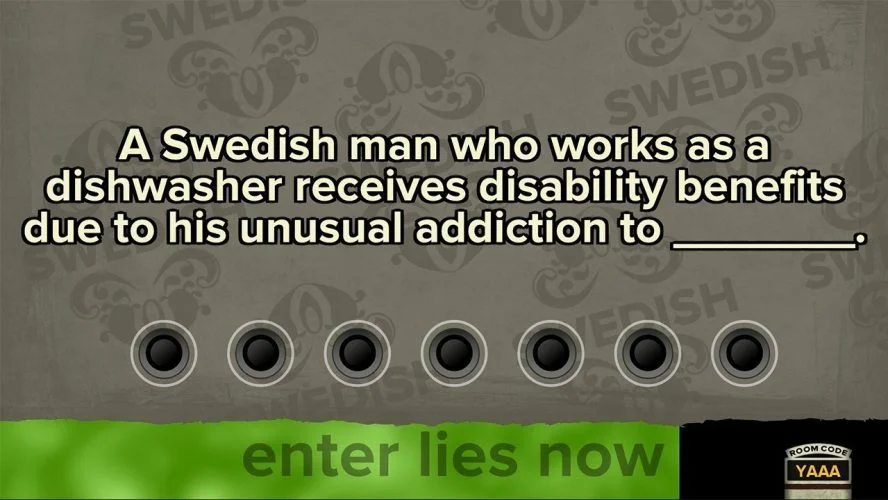
For my competitive analysis, I chose to play Fibbage (or more specifically, its sequel Fibbage 2) because it has bluffing as a core mechanic, similar to our social game Risky Quizness. (Thankfully, it was easy to convince my friends to help me out with my homework.)
Overview
Fibbage 2 is a party game developed by Jackbox Games and published as part of the Jackbox Party Pack 2, which is available for several different platforms including PC/Mac through Steam, as well as consoles such as PS3, PS4, or the Nintendo Switch. It supports between 2-8 players who join from their own device (desktop or mobile) using a game code. Although the game doesn’t have an advertised target audience, it’s not exactly family-friendly, so I’d probably wager that the target audience is teenagers and older.
The game is a multilateral competition described as a “fib-till-you-win trivia game”: each turn, the players are given an obscure fact with a blank. The goal of the game is to fill in the blank with a believable answer that tricks the other players into thinking it’s the truth, while correctly guessing the true answer yourself.
Mechanics & Kinds of Fun
Each game of Fibbage 2 is split into three rounds. The first two rounds consist of several questions each, while the final round (the “Final Fibbage”) consists of only one. Each question starts with one of the players choosing a category (some highlights from our game include categories such as “Loneliness” and “Arousal”). Then, all players see an obscure trivia fact with one detail left blank, and are given time to enter their lies.

Next, players see the lies everyone entered, as well as one answer that is the truth, and have to select which one they think is true. Fibbage 2 specifically also has the option to use a De-Fib-Rillator once throughout the game to eliminate all answers choices except for one lie and the truth.

Finally, points are awarded for each question to players who selected the truth and players whose answers fooled others. Questions are worth the fewest points in Round 1 and the most points in Round 3. The player with the most points at the end of the game wins!
Two mechanics stand out to me as contributing to the fun of Jackbox:
- Likes and the Thumbs Cup: In addition to voting for which answer they think is true, players can give “likes” to answers they thought were funny or convincing. The player whose answers receive the most likes throughout the game wins the “Thumbs Cup” at the end of the game. I think this is an especially effective mechanic because it allows for flexibility in play styles: Players who really want to come up with convincing lies can play to earn points, while those who enjoy coming up with funny responses more can go for the Thumbs Cup. This can lead to both a Challenge aesthetic and an Expression aesthetic, depending on what players’ goals are.
- Narration: All Jackbox games have a host that narrates gameplay with pre-recorded segments, such as “Nobody picked these winning lies”. In my opinion, the humorous narration elevates Fellowship within the game, since it feels like you and your friends are on a game show and the whole experience just feels more personal. The narration is also accompanied by funny sound effects (such as a toilet flush), which contributes to a Sensation aesthetic.
Graphic Design
The game is designed with mostly dark/dull colors, which contributes to the theme of lying/deception. The visual design of the game is pretty simple, with the question and players’ lies being the main things that are highlighted on the screen. I like that there aren’t a lot of extraneous details on the screen that make it hard to focus on the task at hand. In addition, I also noticed that there are a lot of iguanas throughout gameplay (for example, on the card that is revealed as the truth) — I’m not really sure why that is and Google couldn’t tell me, but I thought it was a fun tidbit 🙂

Competitive Edge
In my opinion, the main factor that differentiates Fibbage from both trivia games and other social deception games is the selection of questions. The questions on Fibbage consists of extremely obscure and often inappropriate/NSFW facts. This makes it much more enjoyable to come up with lies that fit the question since it’s unlikely that anybody will actually know the answer. This differentiates Fibbage from other trivia games since the goal in those games is often to actually know/guess the correct answer, whereas one can succeed at Fibbage without knowing any of the answers just by coming up with good lies. However, the inverse is also true: one can win just by guessing the truth, even if they can’t come up with any convincing lies. The fact that there are different ways to play (and win) the game helps Fibbage cater to players with different interests and strengths, and we could definitely learn from their success when choosing questions for Risky Quizness!
Handling Abuse
As far as I know, Fibbage doesn’t have any in-game censors to prevent players from entering abusive or inappropriate responses. Since you don’t play with strangers, but only people who have the game code (presumably your friends or people you otherwise know), this was probably not a huge priority, and players were trusted to handle themselves. However, the game is otherwise balanced to ensure that one player doesn’t end up dominating the others (at least by way of gameplay mechanics). The player who selects the category changes for each question, so everybody gets an opportunity to play to their strengths. In addition, since players’ answers are shown anonymously, it’s difficult to specifically target one player.
How I Would Improve Fibbage
- Give players extra points for immediately guessing the truth! There was one instance throughout gameplay where I actually managed to guess the correct answer while entering my lie (the game told me my lie was the truth and to pick another one). Of course, I was able to correctly pick out the truth once it was time to vote, but I felt I should have gotten brownie points for getting it before even seeing the options.
- Allow players to write in their own questions. Another fun extension could be to give players to write in their own questions (maybe about each other, or things relevant to their lives) — this could make it feel more personal and enhance Fellowship.


